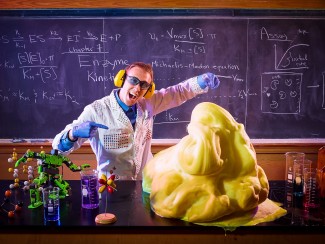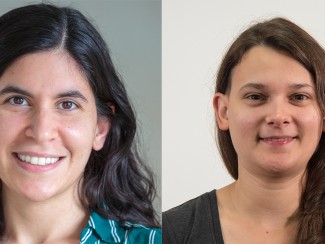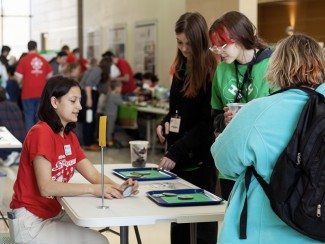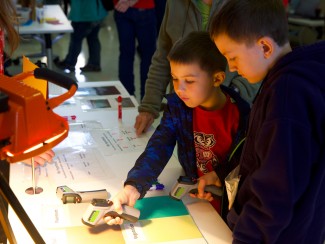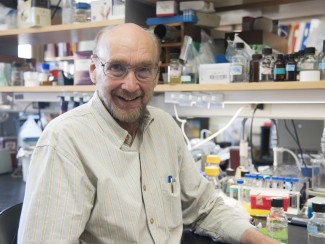See the World, Feed the World: Tech-Savvy Ridesharing, Micro-Livestock Farming Take Top Honors at Energy and Sustainability Challenge
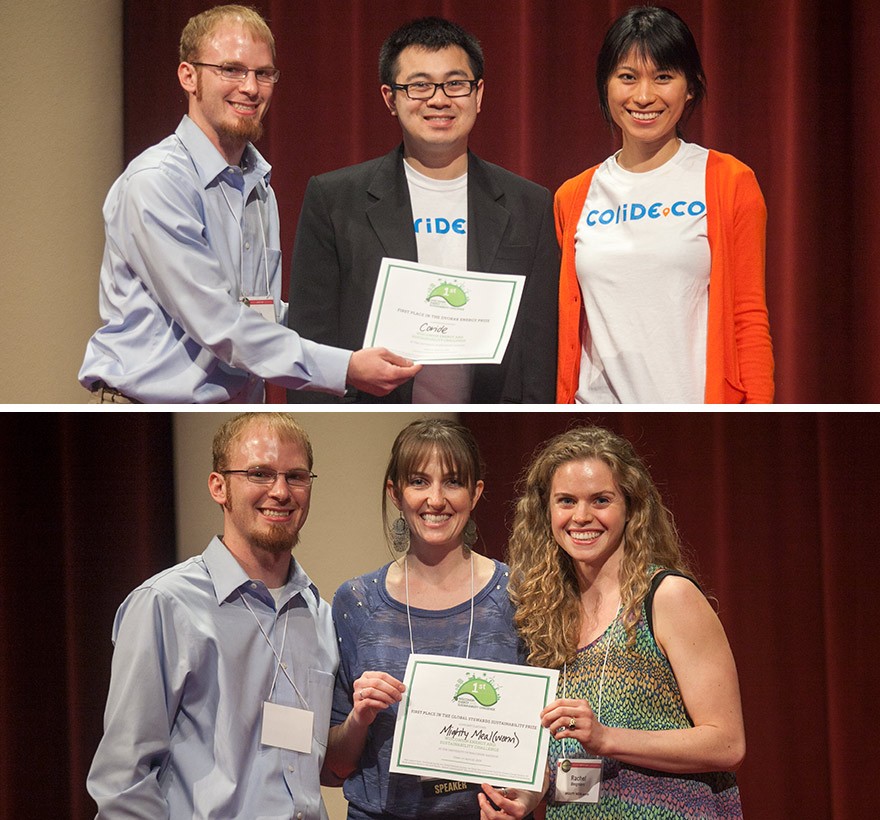
Madison, WI - The Wisconsin Energy Institute and Nelson Institute for Environmental Studies at the University of Wisconsin–Madison hosted eight teams of students in the 2014 Wisconsin Energy and Sustainability Challenge.
The Coride team (pictured top), led by Fei Ma, a PhD student in Geography, and Nade Sritanyaratana, a PhD student in Biomedical Engineering, estimates that young Americans spend more than 2 billion hours per year on road trips. Historically, buses, trains or friends accommodate those trips, but the timing is often inconvenient or the cost is too high. Coride allows users to interact with a mobile-based interface and find ridesharing opportunities along a route, without being limited by starting point location.
The Mighty Meal(worm) team (pictured bottom), led by Nelson Institute PhD student Valeria Stull and Epidemiology PhD student Rachel Bergmans, seeks to provide location-based micro-livestock kits in food scarce rural and urban areas. In 2013, the UN Food and Agriculture Organization estimated that 870 million people struggle with hunger worldwide. By farming mealworms and converting to a protein powder, the Mighty Meal(worm) team believes the insect meals can help fight food insecurity and malnutrition while requiring drastically fewer inputs than traditional livestock.
"All of the student teams did an excellent job. The judges were thoroughly impressed with the quality of the submissions this year,” said Scott Williams, research and education coordinator at the Wisconsin Energy Institute. “What seemed to set the winners apart was that they thought more holistically about how they could implement their ideas in a way that could make a large impact."
Dvorak Energy Innovation Prize
First Place - $5,000 prize: Coride
The Coride team, led by Fei Ma, a PhD student in Geography, and Nade Sritanyaratana, a PhD student in Biomedical Engineering, estimates that young Americans spend more than 2 billion hours per year on road trips. Historically, buses, trains or friends accommodate those trips, but the timing is often inconvenient or the cost is too high. Coride allows users to interact with a mobile-based interface and find ridesharing opportunities along a route, without being limited by starting point location.
Second Place - $1,000 prize: Drsti
Vitamin A deficiency is a health concern throughout the developing world that affects more than 200 million children every year. Team Drsti, made of members Chris Johnson and Mary Pitassi, both masters students in Bacteriology, have described their product as "a sustainable solution to vitamin A deficiency." Project Drsti will develop a probiotic bacterium engineered to make a precursor of vitamin A. The strain will be inexpensive to produce, store and transport, and can be easily added to yogurt or other fermented dairy products.
Third Place - $500 prize: RaPID
RaPID, or the radioisotope powered isolated device, was created by nuclear engineering undergraduates Kazi Ahmed, Garrett Andrews, Xavier Durawa and Jon King. Now ubiquitous chemical batteries have some critical issues, such as: limited capacity, shelf-life and their high weight per unit of energy stored. Their solution? The concept for a nuclear battery. The team believes that in using betavoltaic battery technology to capture the energy emitted by radioactive decay there is potential for immense energy density and longevity. The technology is currently used in pacemakers or space probes, but team RaPID want to expand it's applications.
The Global Stewards Sustainability Prize
First Place - $5,000 prize: Mighty Meal(worm)
The Mighty Meal(worm) team, led by Nelson Institute PhD student Valeria Stull and Epidemiology PhD student Rachel Bergmans, seeks to provide location-based micro-livestock kits in food scarce rural and urban areas. In 2013, the UN Food and Agriculture Organization estimated that 870 million people struggle with hunger worldwide. By farming mealworms and converting to a protein powder, the Mighty Meal(worm) team believes the insect meals can help fight food insecurity and malnutrition while requiring drastically fewer inputs than traditional livestock.
Second Place - $1,000 prize: Sustainable Fertilizer Recovery from Wastewater
The Sustainable Fertilizer Recovery from Wastewater team is made of Tyler Anderson, a soil science graduate research assistant, Rania Bashar, PhD in biological systems engineering, Cody Calkins, soil science undergraduate, Grant Herrman, biological systems engineering undergraduate, and Logan Voellinger, biological systems engineering. Their concept is to develop and incorporate an electrodialysis cell at existing wastewater treatment facilities to capture and concentrate nitrogen, which can be used in fertilizers.
Third Place - $500 prize: S.M.A.R.T
S.M.A.R.T, or the Smart Multi-tech Automated Real Time home energy management system, was developed by Ashray Gururaja Manur, an electrical and computer engineering graduate student, and Yaidi Cancel Martinez, an urban and regional planning PhD student. Their project combines the ability to control and monitor a home's electrical devices, view data or usage schedules, the ability to integrate with a time-based metering system and access to the SMART Energy Network. The team describes their project as "an intelligent power automation system that provides state-of-the-art monitoring, metering and control of electrical appliances."
About the Wisconsin Energy and Sustainability Challenge: WESC is a student competition aimed at advancing creative ideas in energy and environmental sustainability. The challenge combines the Dvorak Energy Innovation Prize and Global Stewards Sustainability Prize. This year’s competition was held at the April 22nd Nelson Earth Day Conference and supported by the Dvorak Family, the Global Stewards Society, BP, Madison Gas and Electric, and the David Marca Memorial Fund for Student Energy Projects. More info: energy.wisc.edu/wienergychallenge
Contact: Scott Williams, Wisconsin Energy Institute spwilliams@wisc.edu, (608) 890-2199

